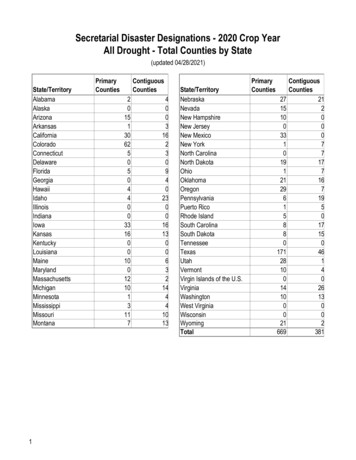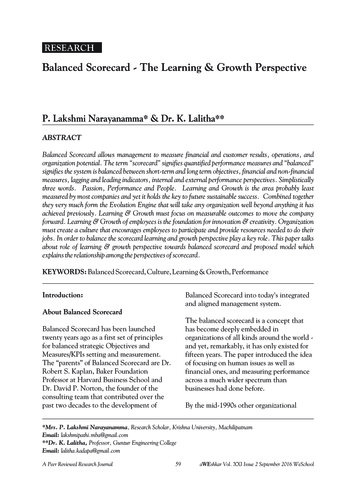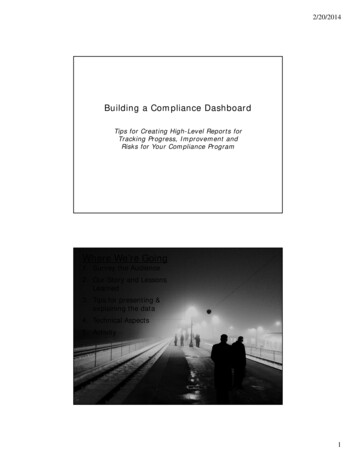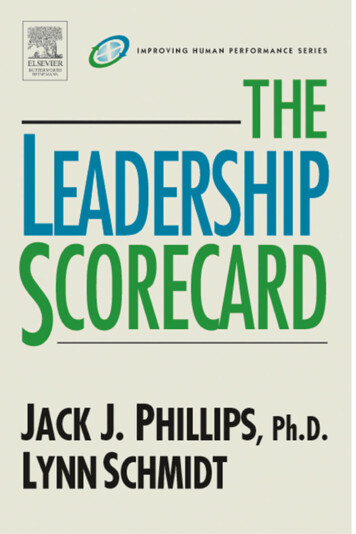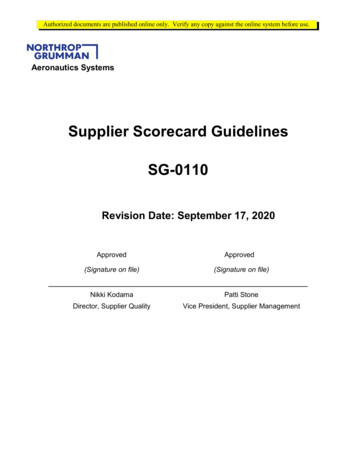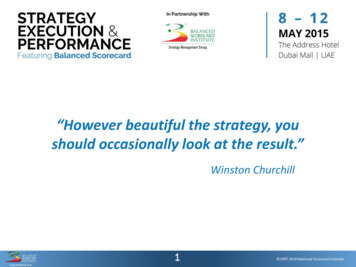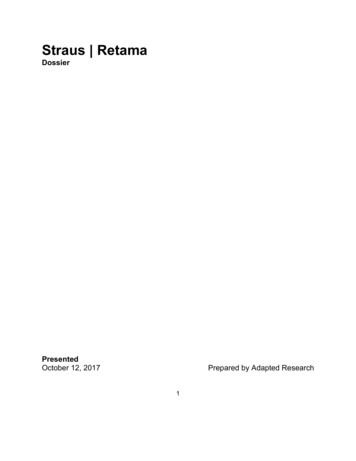
Transcription
Straus RetamaDossierPresentedOctober 12, 2017Prepared by Adapted Research1
2
Adapted ResearchInformation to assist in public relations and grassroots political campaigns, bothindividual and issue-based.3
Executive SummarySince its inception, the story of Retama has never been completely told. News articles thattouch on the track usually lack needed context and key elements. This may be attributable inpart to the complexity of the endeavor or the power of the individuals involved.For example, as recently as June 2017, Retama fallout continues to be reported withoutvaluable context and a permanent links back to the originators of the debacle, the Straus family.In the spring of 2017, the Securities and Exchange Commission prevailed in a lawsuit againstChristopher J. Hall, formerly head of Call Now Inc., which bailed Retama out from 1997 to 2013.That ruling against Hall did not include a substantial monetary reprimand. The SEC petitionedfor a larger fine and recently a judge ordered Hall to pay back 3.7 million in ill-gotten gains plusinterest.Call Now Inc. and Hall made the same bet as the Straus family: that the State of Texas wouldexpand gambling to Texas horse racing tracks.Retama and horse racing in Texas in general is a Straus family venture. Speaker Joe Straus III,whose business interests have included family trusts with ownership of Retama, has a stake inthe potential of future expanded gambling.Speaker Joe Straus III was the Marketing Director for Retama in the early years. As part of themanagement, Straus’s “low-key” approach to marketing was blamed in part for sending theracetrack into bankruptcy.The Retama story is filled with a multitude of untrustworthy people, bad decisions, anddishonest ploys at taxpayers’ expense. Overall, it is difficult to find an aspect of Retama that isabove board.Speaker Straus benefits greatly from the lack of reporting of his direct connections to Retama.He also benefits from the confusing nature of Retama’s business organization and history.However, the corruption itself is not confusing. While a comprehensive understanding ofRetama is possible, it is easy to get buried in the weeds of corruption when tracking the storyfrom start to finish.This dossier seeks to accomplish two tasks. For those who want to know the big picture and befluent on the history of pari-mutuel gambling and its originator in Texas, the Straus family, there4
is a condensed history. Also provided in this document are background materials and a morecomprehensive history, outline of key individuals and additional documents includingdepositions and UT-San Antonio archive notes that paint a more full picture.5
Table of ContentsIntroduction8Retama Timeline11Straus Connection Remains15The Straus Family, Responsible for Retama15Joe Straus III Directly Connected to Retama16Retama brought to you by Straus and Democrats18Economics20Bankrupt20Joe Straus III to Blame?20High Risk Investment20Slots, Not a Fix22Off-Track Betting Request221989 Tax Break Request22Financing Issues & Selma23Retama Loophole Created24Companies Linked to Retama25Retama’s confusing corporate structure25The Retama Entities25Ownership Diagrams26Companies Linked to Retama31Retama Development Corporation31Call Now Inc. (Collapse)31Call Now Inc. (IRS Sanctions 773,750)31Penson Sued for Retama involvement in class action lawsuit32SEC Seeks Action Against Brokerage Firm32BDO SEIDMAN32Retama Lawsuit Research346
Deposition:Margaret “Jan” Smalling Haynes35Deposition: Tommy Azopardi39Deposition: Bryan Brown42Disciplinary ActionsWilliam “Bill” Allen (Deceased)50Ken Roberts50Thomas R. Johnson51Christopher J. Hall51Robert C. Buffkin51Appearance of Impropriety53Elgin Friesenhahn53Lisa Medrano53Ken Flennor53Steve Kosub53Dishonorable Mentions54Retama Individuals557
IntroductionThe story of gambling on horse racing in Texas and the Retama racetrack is one ofuntrustworthy people misleading Texans into a financial boondoggle. When it comes to Retama,it is difficult to find any aspect of the endeavor that is above board.Speaker Joe Straus benefits from a lack of focus on his direct connection to Retama, a lack ofreporting on the history of how pari-mutuel gambling was legalized, and how the track in Selma,Texas was originally developed.This brief history provides a bird’s eye view of how we’ve come from no legalized gambling onhorseracing in the 1980s, to the failure of racing and bankruptcy of Retama in the 1990s, to thecontinued unsavory activities of Straus’ partners and allies in the 2000s.Included in this report are in-depth and heavily-footnoted sections on the following items:History - from zero and back again, the failure of pari-mutuel gambling in TexasThe Crew - the cast of characters involved in Retama including convicted criminalsBroken Economics - pari-mutuel gambling alone was never going to workThe Enemy - horsemen have been used and abused for profitThe StoryFirst things first the only reason gambling on horseracing exists in Texas today is the Strausfamily.Speaker Joe Straus III’s grandfather, Joe Straus Sr., was involved with the horseracing industrybefore it was legalized and then outlawed again in the 1930s. It was outlawed in 1937 after justfive years of operation because it substantially underperformed economic projections. This is arecurring issue with the current iteration of legalized pari-mutuel gambling.Joe Straus Jr. was the driving force behind getting pari-mutuel gambling legalized again in1987. He was lobbying as far back as 1966, but formalized and energized his efforts in 1973when he founded the Texas Horse Racing Association. His activity between 1973 and 1987culminated with the passage of the Texas Racing Act by the Texas Legislature during adownturn in the oil industry.8
After selling lawmakers and the public on the viability of pari-mutuel gambling on horse racesand convincing them to adopt a constitutional amendment to legalize it, Straus reneged,claiming that it was not going to be profitable under the terms he proposed and Texansconsented to in 1987.Straus Jr., who had been lobbying for betting on horses for 21 years, claimed ignorance to theproblems with the legislation he helped pass. “The problem is we passed a bad bill,'' he said.“None of us knew what the hell we were doing.''The Straus family asked for and was eventually given an 80% tax cut by Democratic Gov. AnnRichards. Only after they were awarded the tax cut did Straus began to pursue the constructionof a Class 1 race track in the San Antonio area.In 1995, during the 74th Legislative session, Senator Jeff Wentworth passed a resolutioncrediting Straus Jr. and the Straus Family with the creation of Retama Park.The Straus name is synonymous with the track. One headline from 1996, while the park wasgoing through bankruptcy, read Retama Park Still the House of Straus.1The public-private nature of Retama, its bankruptcy, and its various acquisitions has led toconfusion about Straus’ ownership interest in the track. Straus and his family continue to have astake in the track and would reap a windfall if gambling were expanded in the future.Speaker Straus still stands to gain from the legalization of gambling and has an interest inRetama through his family connection and continued stake in the Straus 2003 Irrevocable Trust.At a Texas Tribune event following the acquisition of Retama by Pinnacle Entertainment, Straussaid that his family stood to gain financially should historical racing machines (slot machines) beinstalled at Retama.Pari-mutuel gambling in Texas and the failure that it has been over the last three decades canbe laid at the feet of one family.The Straus family used a small town to off-load risk and run an enrichment scheme that leftvendors and bondholders out tens of millions of dollars.1Express-News Staff Writer, Tim Price. "Retama Park Still the House of Straus - Track chairman's rolecould be up in the air under new owners." San Antonio Express-News, 2 Jun. 1996.9
As they had from the beginning, the Straus family had worked to minimize exposure to risk onthe project. When the track declared bankruptcy in 1996, the Straus family investment wasreported to be less than 4 million of the 80 million spent to build it.In 2008 Retama was at risk of going under and sought a loan from the Texas ThoroughbredAssociation. The terms of the loan were that it would be repaid when the horse racing operationat Retama found a buyer. That buyer eventually emerged and a majority interest in Retama waspurchased by national casino operator Pinnacle Entertainment.Following the sale, the Thoroughbred Association tried to recoup its loan but was denied on acontractual technicality. The Association sued. Excerpts from depositions from that lawsuit areincluded in this report and help further illuminate the despicable nature of the cabal behindRetama.Since 1990 there have been several attempts to expand gambling in Texas, specifically at horsetracks. The latest attempt was to circumvent the legislature altogether and use the TexasRacing Commission to install slot machines under the guise of “historical racing.”That attempt was eventually crushed when the Racing Commission was faced with beingdefunded by the legislature. Even had that effort succeeded, it’s no sure bet that it would havesaved the doomed horse racing industry.Richard Thalheimer, an economist from Kentucky, in 2010 stated that slots at racetracks is theonly option racetracks have for raising more revenue but are only a short-term solution. "Ifpeople cannot be attracted to bet on horse races, in the long run, the outlook is the same," hesaid. "This buys you time to figure out how to get people back to betting on horses."10
Retama Timeline Horse racing is legalized in 1933, touted as a revenue source during the GreatDepression. The sport lasts just five years before gate receipts dwindle. Gov. James V.Allred abolishes racetrack gambling in 1937. In 1974 Joe Straus Jr. accuses Texas Baptists of “blackmail” and “bullying tactics” intheir opposition to expanded gambling.2 In 1987 the Texas Legislature legalizes pari-mutuel gambling on horseracing. Theprovision required statewide voter approval and county approval for individual trackdevelopment. In 1989 Democrat Senator Hector Uribe authors SB 820, empowering municipalities totake on debt via bonds that would be repayable from future racetrack profits. Theissuance of bonds circumvents voters. December 1990 – Incoming Gov. Ann Richards’ spokesman states that pari-mutuelwagering is very close to the top of her agenda and that "she wants those tracks openedand running."3 May 1991 – The Texas Legislature approves an 80% tax cut bailout (five cents on thedollar to one cent) for horse track gambling operations. This is after horse racing wassold to voters in 1987 based on the revenue expected from the five-cent tax. September 1991 – The Texas Racing Commission approves Retama’s Class 1 racinglicense with one dissenting vote. June 1992 – It is first reported that Selma is going to issue bonds to pay for Retama’sconstruction. The City of Selma issues 70 million in tax-exempt municipal bonds to fundconstruction of the track. Joe Straus Jr. and a group of investors lead the development of Retama Park whichopens on April 7, 1995.2"Baptists vs. another Straus, 1974: "Texas Baptists Blast Remark"." Fort Worth Star-Telegram: Blogs(TX), 5 Jan. 2009, PoliTex.3COULTER, BILL. "Pari-mutuel's nag - Racing has failed to produce revenue industry promised."Houston Chronicle, 30 Dec. 1990, 2 STAR, STATE, p. 4.11
In 1995, the track runs over-budget on operational expenses. Retama owes more than 4 million to companies that provided items including betting equipment and services,audio and visual equipment, and advertising. Retama has a dismal opening season,missing business projections by 40 percent and losing as much as 250,000 per week.4 November 1995 – Retama suspends live racing. December 1995 – Less than eight months after opening, “Retama is looking for a savior”and actively seeking buyers or investors as the track is already known as a financiallytroubled loser. March 21, 1996 – Retama declares bankruptcy. Lee Katz is brought in to negotiate withvendors and the debts are allowed to continue to accrue while operations continue. AfterRetama emerges from bankruptcy, these creditors (small businessmen and women) arepaid, “according to Katz, 5 cents to the dollar.”5 “Vendors who provided services toRetama lose more than 2 million.”6 July 13, 1996 – A deal between Call Now Inc. and Retama is reported.7 September 1996 – Call Now, Inc., (Call Now) completes 10.3 million payment to buyRetama Park's senior debt.8 In 1997, Call Now becomes controlling owner of Retama Entertainment Group Inc.,owning an 80 percent stake.9 104Express-News Staff Writer, Tim Price. "Retama Park gets boost as judge OKs reorganization." SanAntonio Express-News, 14 Feb. 1997, Sports, p. 1C.5Express-News Business Writer, Tim Price. "Rebuilding Retama - Selma racetrack betting on new lifeafter bankruptcy." San Antonio Express-News, 4 May 1997, Business, p. 1H.6Express-News Staff Writer, Tim Price. "Retama Park gets boost as judge OKs reorganization." SanAntonio Express-News, 14 Feb. 1997, Sports, p. 1C.7AP. "Retama Park hopes it has found financial savior." Austin American-Statesman (TX), 13 Jul. 1996,Final, Sports, p. D3.8Express-News Staff Writer, Tim Price. "Call Now completes deal with Retama." San Antonio ExpressNews, 27 Sep. 1996, Alamo, Sports, p. 4C.9Danner, Patrick. "Ex-chairman linked to Retama Park barred; SEC case leads to exec's penalty forviolations." San Antonio Express-News (TX), 15 Apr. 2017, State, Business, p. B001.10"Setting It Straight." San Antonio Express-News (TX), 29 Sep. 2005, METRO, A Section, p. 02A.12
February 1997 – Retama emerges from bankruptcy proceedings following debtacquisition by Call Now and Howe, Solomon and Hall. July 1998 – Call Now explores and puts a 2 million down payment on three track dealwith Edward J. DeBartolo Corp.11 January 1999 – Bryan Brown resigns as president of Call Now to “give sole attention tomatters at Retama.”12 April 1999 – Bryan Brown and Retama investors explore opening a track in Austin. It’sunclear if Call Now will be part of the venture. May 1999 – Call Now sells 7 million in debt to “institutional investors.”13 In 2001, Christopher J. Hall became the controlling shareholder in Call Now. Hallbecomes Chairman in 2008. September 2010 – Call Now is publicly searching for an equity partner to make principaland interest payments on senior debt. June 1, 2011 – Call Now holds annual shareholder meeting at Retama Park.14 July 2011 – Call Now stock is trading at 5 per share. July 2011 – Pinnacle denies reports it is interested in acquiring Retama.15 August 2011 – Penson Worldwide Inc. begins foreclosure filings on Call Now. Pensonprovided margin loans to Call Now. October 2011 – Call Now informs the SEC it is curtailing operations and will no longerfile reports because it can no longer pay for accountants.1611PLAIN DEALER REPORTER, PAT GALBINCEA. "THISTLEDOWN SALE SHOULD BE COMPLETEDBY AUTUMN." Plain Dealer, The (Cleveland, OH), 2 Jul. 1998, FINAL / ALL, SPORTS, p. 3D.12Price, Tim. "Race meet to start on time at Manor." San Antonio Express-News, 8 Jan. 1999, Metro,Sports, p. 2C.13Price, Tim. "NOTES." San Antonio Express-News, 7 May 1999, Metro, Sports, p. 10C.14"THIS WEEK IN BUSINESS." San Antonio Express-News (TX), 30 May 2011, STATE&METRO, ASection, p. 11A.15Danner, Patrick. "GAMING ; BETTING ON LEGISLATION CHANGE ; Retama courting Vegas forfunding." San Antonio Express-News (TX), 20 Jul. 201113
October 2011 – Call Now stock is trading at a 52-week low of 25 cents. November 2012 – Pinnacle is reported to be close to acquiring a majority interest “in thepartnership that owns the track.”17 Call Now ends its involvement with Retama at the end of 2012. December 2012 – Pinnacle acquires a majority interest in Retama.18 Pinnacle takes overthe Retama track license in a 22.8 million deal.19 August 2014 – Texas Racing Commission adopts “historical racing” rules to allow slotmachines at horse racing tracks. November 2014 – A Travis County court blocks implementation of “historical racing.” A civil lawsuit is filed against Call Now Chairman Christopher J. Hall in 2015. February 2016 – Pinnacle goes on record as being upset about TXRC historical racingrules being repealed by Racing Commission.20 February 2017 – Jury finds Call Now Chairman Christopher J. Hall guilty. April 13, 2017 – Judge bars Hall from serving as a director of a public company. June 2017 – Judge revisits ill-gotten gains ruling for Call Now Chairman Hall and orderspayment of 4.7 million.16Danner, Patrick. "Retama's parent in trouble." San Antonio Express-News (TX), 12 Oct. 2011,STATE&METRO, Business, p. 01C.17Pack, William. "RETAMA ; Layoffs at racetrack a formality." San Antonio Express-News (TX), 28 Nov.2012, State, Business, p. 2C.18Whisler, John. "Horse racing ; Political fight puts Retama in jeopardy." San Antonio Express-News(TX), 20 Aug. 2015, State, Sports, p. 1C.19Danner, Patrick. "SEC prevails in case against Call Now Inc. chairman Hall; He is to ante up about 4.7M in ill-gotten gains, fines for frauds." San Antonio Express-News (TX), 30 Jun. 2017, State,Business, p. B001.20Rosenthal, Brian M. "Betting game loses state's OK ; Panel rescinds its approval of historical racing."San Antonio Express-News (TX), 19 Feb. 2016, State, Metro, p. 3A.14
Straus Connection RemainsThe Straus Family, Responsible for Retama1. The State of Texas officially credited Joe Straus Jr. and the Straus family with thecreation of Retama Park in a congratulatory resolution authored by Senator JeffWentworth during the 74th Legislative Session. This resolution flies in the face of theStraus-family blame-shifting and blame-sharing they’ve done since Retama’s financialtroubles became public.2. Joe Straus, Jr., dominates the minutes of the original Selma City Council meetings atwhich he convinced the tiny town of just 600 people to buy land and build a racetrack forhis family.3. The Fort Worth Star Telegram heralded Straus Jr. as the architect of the Retama effort.A FWST article published November 20, 1994 reported:Joe Straus Jr., a San Antonio businessman, carried on his father's vision ofreturning major horse tracks to Texas. He traveled the state promoting horseracing for years before it was legalized again, and he founded the Texas HorseRacing Association.His brother, David Straus, and son, Joe Straus III, are also involved withRetama Park.[Emphasis added]After years of planning and months of ironing out the financing, Retama Parkfinally began construction in January. Come April 7, the track will startthoroughbred racing three days a week and move to a five-day schedule in May.The starting gates can't open soon enough for the Straus family."I think San Antonio and South Texas have been ready for this for a long time,"said Joe Straus Jr. "Hopefully, we'll be just as ready for it as the people will be.”2222Shannon, Kelley. "Horse track near San Antonio heads down home stretch." Fort Worth Star-Telegram20 Nov. 199415
Joe Straus III Directly Connected to Retama1. There are over 50 news articles listing Joe Straus III as “the Marketing Director” ofRetama Park.2. Straus was also involved in the planning phase, according to a news article:While working in Washington, D.C., during the early '90s, prior to joining hisfather's racetrack project as marketing director, Joe Straus III asked a racingconsultant for advice on a track president."He told me the guy we wanted for this thing was Bob Quigley," Straus said. "Buthe said that we wouldn't get him because Bob had done his thing. He wasestablished."233. Straus III et. al. knew the track was a gamble according to a San Antonio Express-Newsarticle:Retama Park began on a bet, according to Joe Straus III, director of marketingfor Retama Park Association.In 1987, the Texas Legislature legalized pari-mutuel betting.But after studying the feasibility of building a big racetrack in Texas, the Strausesconcluded that such a venture would not be economically viable. So they askedthe legislature to revise the law. In 1991, the Legislature responded, byessentially lowering state taxes on racetracks and making a provision forsimulcast betting, Straus said.However, the Strauses had to apply for their Retama license before theLegislature changed the law. The application fee, payable to the Texas RacingCommission, was 1 million.244. Straus III truthfully said the project was a gamble, but this is contrary to what Joe StrausJr. led Selma City Council Members to believe. According to a Wall Street JournalArticle:23Price, Tim. "Retama's man at the helm -Another challenge for Quigley." San Antonio Express-News 1Feb. 1995.24Gibbs, Kristi. "Satellite wagering to start in fall at Retama." San Antonio Express-News 27 Jul. 1994.16
Like Sam Houston's owners, the Strauses were rebuffed in their first attempt toarrange financing for the 75 million track. "We found it would require a lot moreequity, and be more expensive all the way," says Joe Straus III, the track'sdirector of marketing.To reduce the costs, investment bankers Rauscher Pierce Refsnes Inc. in Dallasarranged for the city of Selma, a San Antonio suburb of 600, to issue tax-exemptmunicipal bonds. The city will own the track, leasing it to the Strauses, but won'tbe liable for repaying the debt, which will be paid out of the track's proceeds.5. Joe Straus III, when he was first elected in 2005 and subsequently has disclosed himselfto be a beneficiary of the Straus 2003 Irrevocable Trust which owns an 8.17% stake inRetama.17
Retama brought to you by Straus and DemocratsJoe Straus and parimutuel gambling are brought to you by Democrats.First, the commonly reported concept that the Straus family are dyed-in-the-wool Republicans iswithout merit. In a 2009 article about Straus becoming Speaker, the Austin American Statesmanhonestly portrayed Straus as a flimsy Republican.“Worse for [Republican] party loyalists: At the polls, Straus occasionally choosesDemocrats. He even favors legislation forbidding automatic straight-ticket voting.”25Additionally, in 1998 Straus III and his wife donated to the campaign of Democrat Paul Hobby.His father Joe Straus Jr. publicly supported Hobby’s campaign for Comptroller.When it comes to gambling in the state of Texas, and specifically the parimutuel variant,Democrats have been heavily involved.Democrat Hugo Berlanga sponsored the 1986 legislation that legalized pari-mutuel wagering inTexas. He was later linked to a dog racing track in 1991 as he worked to get taxes on parimutuel gambling lowered.Democrat Speaker of the House, Gib Lewis “played a pivotal role in the passage of legislation26allowing pari-mutuel horse and dog racing in Texas.” Lewis’ Speakership was brought to anend in part due to this close connections, business dealings, and travel with a horse racinglobbyist.Berlanga and Lewis, along with horsemen and legislative proponents Sen. Ike Harris (R-Dallas)and Rep. Lloyd Criss (D-Galveston) were credited with the eventual passage of the TexasRacing Act in 1986.In 1989 Democrat Senator Hector Uribe authored SB 820 which empowered municipalities totake on debt via bonds that would be repayable subject to horse track profits. The issuance of25Selby, W. Gardner. "A natural long shot." Austin American-Statesman (TX), 22 Feb. 2009,Final, MAIN, p. A01.26SABLATURA, BOB. "Speaker failed to report 30,000 loan, records show." HoustonChronicle, 1 Feb. 1991, 2 STAR, A NEWS, p. 1.18
bonds circumvented voters. This bill and mechanism was used to sell Retama development tothe City of Selma.Legislation that enabled Joe Straus III to begin development on Retama, the 80% tax cut, wasmade a priority by Democrat Ann Richards.In December 1990, Richards’ spokesman stated that pari-mutuel wagering was very close to the27top of her agenda and that, "She wants those tracks opened and running."was granted. The bill was advanced with by Democrats.In 1991 the tax cutIn 1995, former Democratic member of the Texas House Lloyd Criss lobbied the legislature forcasino gambling at Texas racetracks. His daughter, Judge Susan Criss, in 2010 awarded SteveMostyn millions allowing the trial lawyer to further bankroll Democrat campaigns.Gordon Johnson, a Democrat, former lobbyist, longtime Straus ally and business partner, andStraus’s current top political advisor, was the attorney for Retama during its licensing process28with the Texas Racing Commission.Clyde Alexander, a former Democrat member of the Texas House, was Speaker Straus’ firstChief of Staff. Jesse Ancira, Straus’ chief of staff for the 83rd and 84th legislatures also has ahard-Democrat voting history.29On the eve of his election as Speaker in 2009, Straus was given a standing ovation in theDemocrat caucus. Straus is quoted as saying after the event his House would have two rules:"Play fair and be nice."3027COULTER, BILL. "Pari-mutuel's nag - Racing has failed to produce revenue industrypromised." Houston Chronicle, 30 Dec. 1990, 2 STAR, STATE, p. 4.28Editor, To The. "Your Views." Big Spring Herald (TX), 16 Jan. 2011, News, p. 4A.29"There's a certain irony to Democrat Clyde Alexander being named as new House SpeakerJoe Straus's chief of staff." Midland Reporter-Telegram (TX), 28 Feb. 2009.30"Straus welcomed by Democrats." Fort Worth Star-Telegram: Blogs (TX), 12 Jan. 2009,PoliTex.19
EconomicsBankruptRetama opened on April 17, 1995. Less than one year later on March 20, 1996, Retama filed forChapter 9 bankruptcy.Joe Straus III to Blame?According to a 1994 San Antonio Express-News article, Straus III took an unorthodox approachto promoting the track, keeping it “low-key.”As marketing director of Retama Park in San Antonio, it is the responsibility of JoeStraus III to thump the promotional tubs and bring horse racing fans, and their money,streaming into the soon-to-be completed venue.But what is this? He doesn't want to make too big a thing of this? He doesn't want tobeat the drums over-enthusiastically? He prefers to take a low-key approach?Is that any way to promote?Yes, according to the son of the Retama Park chairman of the board, Joe Straus Jr., andnephew of board member and other large investor, David Straus.31Bankruptcy filings included a list of seven reasons for Retama’s failure, including “an inability toproperly educate and market the product.” This was the responsibility of Straus III.High Risk InvestmentA San Antonio Express-News article from 1993 titled “Retama officials still trying to securefinancing” stated:Sources say Retama has attracted between one-third to one-half of the money neededin the equity offering.The source said the closure of the equity would serve as a catalyst for the sale of thetax-free municipal bonds, which are high-risk investments.31SAEN S.A. Track Takes Different Promotional Path May 27 199420
In the same article Straus stated:"Our No. 1 priority is to build a racetrack that is going to be here for the long haul,"Straus said. "We may not have everything that Birmingham (Ala.) Racecourse orCanterbury Downs (in the Minneapolis-St. Paul area) had for their first season of racing,but we will have a comfortable and efficient facility."Straus chided Birmingham and Canterbury, which opened in the late 1980s, becauseboth of those racetracks were elaborate projects that were not supported by themarkets where they were built. [Emphasis added] Birmingham has been converted toa greyhound track with limited live horse racing, and Canterbury Downs is not racing thisyear following severe declines in business the past three seasons.Audits for RDC consistently have the phraseology:Retama Development Corporation has suffered recurring net losses and has a netcapital deficiency as of [date]. These conditions raise substantial doubt about its ability tocontinue as a going concern.The IRS went after RDC starting in 2005 according to a SEC filing made by Call Now Inc.:In February 2005, The IRS issued both preliminary and proposed adversedeterminations with respect to the Company’s outstanding Retama Racetrack ProjectsSeries 1993, Series 1993A and Series 1997A bonds stating that the interest on all thesebonds is not excludable from the gross income of their holders.21
Slots, Not a FixSome of those proposed changes are off-track betting parlors to bring racing to the farreaches of the state, automatic teller machines and cross species betting at horse and dogtracks, they say.Some track owners also would like to offer video poker and other Las Vegas-style gamesthat have boosted attendance at tracks in other states."There are so many inequities in this thing, and they wonder why we are not successful,"lamented Joe Straus Jr., chairman and chief executive officer of Retama Downs in Selma."We have to get rid of some of the restrictive legislation. . . . We have to have some meansof expanding our product," he said.Retama Park, located just north of San Antonio, has faced serious financial problems alongwith Sam Houston Race Park near Houston, the state's other Class One horse track offeringlive racing.Interestingly, an economist from Kentucky, Richard Thalheimer, stated in 2010 that slots atracetracks is the only option to raise more revenue but that he viewed slots as only a short-termsolution. "If people cannot be attracted to bet on horse races, in the long run, the outlook is thesame," he said. "This buys you time to figure out how to get people back to betting on horses."33Off-Track Betting RequestBefore the track even opened, the idea was floated to host off-site gambling at a local club. Thiswas viewed as an action that might lead to expanded gambling. As the track faltered, Retamaneeded a legislative bailout in the form of off-track betting, according to Straus.341989
At a Texas Tribune event following the acquisition of Retama by Pinnacle Entertainment, Straus said that his family stood to gain financially should historical racing machines (slot machines) be installed at Retama. Pari-mutuel gambling in Texas and the failure that it has been over the last three decades can be laid at the feet of one family.
